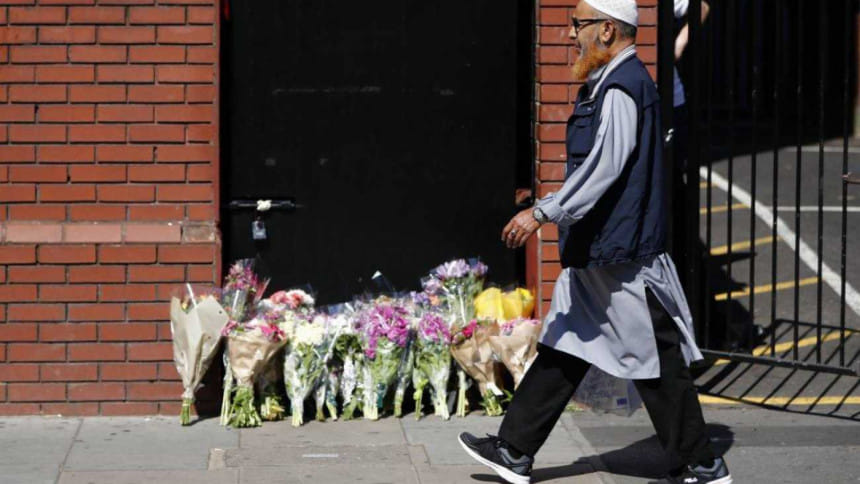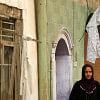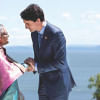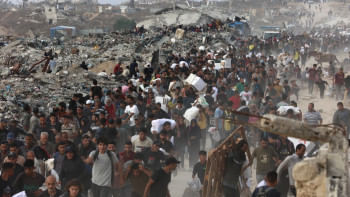What is meant to divide should unite

The Finsbury Park Mosque attack was another manifestation of Islamophobia that has gripped Britain and many other western countries including the US in recent times. Reportedly, there has been a fivefold increase in hate crimes against Muslims in London after the London Bridge attack. There has been a similar spike in incidence of hate crimes against Muslims in the US, particularly after January 20, 2017.
Regrettably, there are a few in Britain who are glorifying the attack as a revenge attack like the English Defence League leader Tommy Adams. There may have been a few Muslims who might have drawn a kind of vicarious delight and rejoiced after the Twin Tower attack or the ones carried out since then by Muslim extremists, but one has not come across such views articulated in any expressed form as one is now seeing in the social media after Darren Osborne's attempt to fulfil his desire to "kill Muslims". A few examples are in order. One commenter said: "A hero…hope he starts a wave of retaliation against the evil within our country that's killed so many already." Reportedly, some have praised Osborne, arrested on suspicion of attempted murder and terror offences, as a "true hero" and "patriot". "Well done that man," said one comment in social media. "Why didn't he use a bigger van?" another asked.
In no way mitigating the deep significance of the attack, I feel that we Muslims should have seen such a reaction coming. Should one be surprised at all by the reaction of a miniscule number of white Christians who believe in 'an eye for an eye'? The IS must be having a big laugh seeing such a response physically manifested in the Islamophobic behaviour. This is exactly what the IS wants. To divide societies that thrive on their diverse and cosmopolitan composition, and generate a situation of mutual animosity that would launch them in a mutually destructive path. And they have succeeded in creating Osborne and his likes who are not many in number though, but enough to inculcate fears in the minds of the Muslims in Britain. This is exactly what the brutal Holey Artisan killers also wanted to do, and was successful for a time. But the most redeeming feature after the mosque attack is the great feeling of unity that was displayed by the people of Islington area in particular and of Britain in general, with leaders of all faiths coming together not only to express grief but condemn the attack in unison, showing their solidarity, and calling it what it is — a terror attack against the Muslims, without hedging the issue as a section of the media did for a time, and the attempt to give the matter a different gloss did not escape the eyes of the more perspicuous followers of the electronic media.
There are the likes of Salah Abdeslam (linked to Paris and Brussels attack), Mohamed Lahouaiej-Bouhlel (Nice attacker) and Khalid Masood (Westminster Bridge attacker) working alone or in unison, some so brainwashed by the distorted interpretation of the religion that they have come to believe that their redemption lies in the annihilation of everyone that does not follow their faith. So much so that they do not hesitate to plough through unsuspecting revellers in Nice or bomb sports lovers looking forward to a football match in a stadium in Paris, or run over pedestrians using the Westminster Bridge. And there are the likes of David Osborne who seek comfort in avenging the killings in Paris or England.
It is more of Abdeslam, Lahouaiej-Bouhlel and Osborne that IS would like to create. It suits their overall strategy well. Having been cornered in Mosul and their stronghold Raqqa, the terrorist group is being increasingly deprived of ground that they had held for the last three years. That will induce a change of strategy on their part certainly, but what that will also induce is creation of surrogates through the use of social media who may not be organically part of IS but would carry out attacks on soft targets at their own behest, motivated by it. And this is where we need to cut across religious lines, as we see in Britain, as well as national boundaries and come together to combat this menace.
I repeat what I have said in the past also, notwithstanding the causative factors that have fawned the growth of IS or al-Qaeda, the lead in this regard must come from the Muslim countries, which, to be true, have borne the brunt of religious extremism more than others. For too long the majority of the Muslims, who neither condone the extremist violence nor the US and western policy in the Middle East, have remained silent against the rise of radicalism, fanaticism and intemperance. It is time for them to convince their leaders to come together and cohere with the rest of the world to formulate a strategy to defeat the extremists, of whatever hue. What is meant to divide should unite us. If not, then an eye for an eye will render the world blind.
The writer is Associate Editor, The Daily Star.










Comments